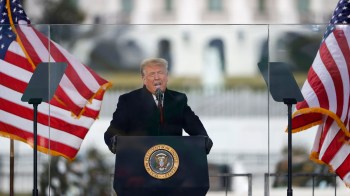BP, gov’t finally accept int’l help on leak
TEXT OF STORY
Kai Ryssdal: Five-thousand feet under the Gulf of Mexico, a diamond-tipped saw spent most of the day stuck inside an oil pipe. BP’s latest try at controlling the leak hit a snag when the saw did the same this morning. They did work it loose late this afternoon. Up on the surface, oil is now said to be visible near beaches in the Florida panhandle. Six weeks in, BP and the federal government have started accepting some international help in cleaning things up. Sophisticated oil skimmers from the Netherlands will soon be at work in the Gulf.
Marketplace’s Nancy Marshall Genzer explains what took so long.
Nancy Marshall-Genzer: The Dutch technology involves giant skimmers attached to large ships. They suck in a combination of oil and water. They separate the two and spit the water back out. Ships fitted with the skimmers will head out from Houston soon.
Why did it take so long? David Kotok is with Cumberland Advisors. He says neither BP nor the Obama administration realized at first just how bad the spill was.
David Kotok: It takes a huge shock to wake people up. And this is a systemic problem, and we did not think of it in systemic risk terms.
In other words, everybody missed the big picture. Stephen Schork edits the Schork Report, an energy newsletter. He says there’s another problem for the government and BP.
Stephen Schork: Look, they are being inundated with ideas and techniques, and we have to make sure that the cure is not worse than the illness at this point.
Plus, you have to be sure these techniques don’t conflict with government regulations. Bruce Johnson is a professor emeritus of oceanic engineering at the U.S. Naval Academy. He says there’s a rule that doesn’t allow contaminated water to be discharged back into the ocean. The Dutch skimming system doesn’t quite remove all of the oil. But Johnson says so much oil is spilling out that’s OK.
Bruce Johnson: My point is if you could collect 80 percent of it, and even discharge 5 percent back in, you’re still way ahead of the game.
And pretty soon, this could be a global game, as the spill spreads out into international waters. Countries like Cuba that border the Gulf of Mexico are watching the spill’s progress anxiously.
In Washington, I’m Nancy Marshall Genzer for Marketplace.
There’s a lot happening in the world. Through it all, Marketplace is here for you.
You rely on Marketplace to break down the world’s events and tell you how it affects you in a fact-based, approachable way. We rely on your financial support to keep making that possible.
Your donation today powers the independent journalism that you rely on. For just $5/month, you can help sustain Marketplace so we can keep reporting on the things that matter to you.


















